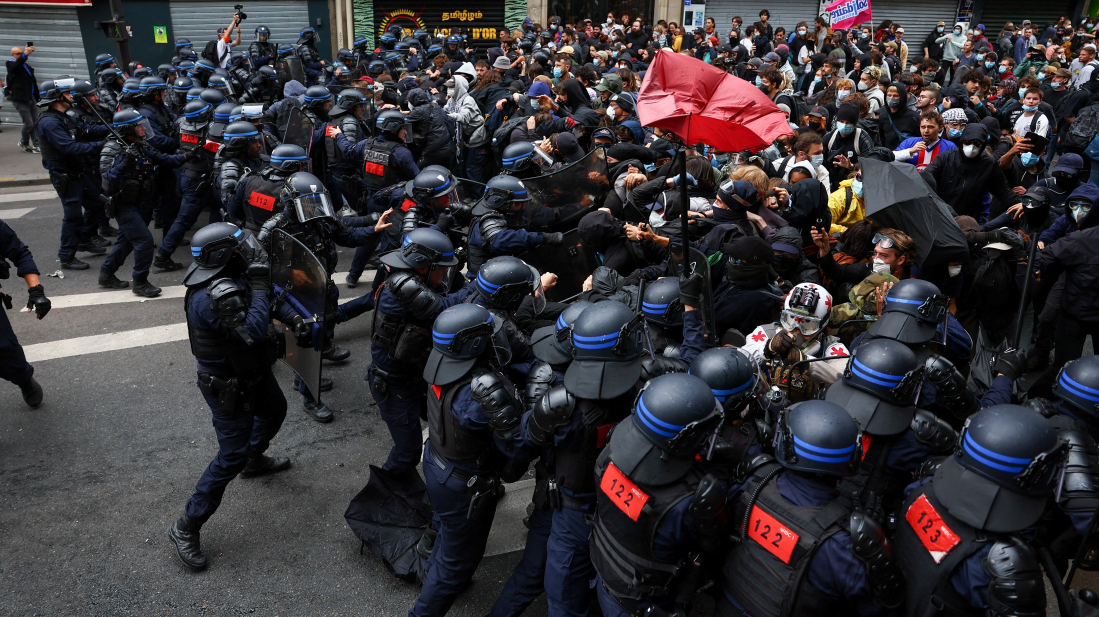Iran strikes: Why now and what next for the leadership in Tehran?
Journalist and International Affairs Commentator, Tom Gross, joined AnewZ from Tel Aviv to tell us why he thinks the attack happened now and whether t...

France is once again facing political turmoil as the 'Block Everything' movement mobilises tens of thousands of protesters, disrupting railway hubs, universities, schools, and government offices.
The origins of the current movement lie in the recent initiatives of entrepreneur Julien Marissiaux, who came out with a radical program in May: popular control over foreign debt, economic restructuring, and the resignation of President Macron.
At the time, his project seemed utopian, but unexpectedly, left and radical left forces joined him. Former activists of the 'Yellow Vests', 'red' trade unions, 'Young Communists' and Jean-Luc Mélenchon's party 'France Unbowed' seized the initiative and made the movement their instrument.
The movement gained momentum on social media platforms such as TikTok, Telegram, and X, with more than 338,000 related tweets posted in August alone. A survey by Toluna-Harris Interactive indicated that 63% of French citizens support the movement.
Initially informal, the protests later received backing from various political and social groups and major trade unions such as CGT and Solidaires. Jean-Luc Mélenchon called for a general strike but clarified he was not managing the movement.
The Interior Ministry deployed 80,000 police and gendarmes nationwide on Wednesday, anticipating 100,000 participants, but authorities reported around 200,000 people attended, while the trade union claimed 250,000 participants.
Key demonstrations took place in Paris, Lyon, Marseille, Bordeaux, Lille, Nantes, and Strasbourg.
Protesters blocked 262 roads, held more than 550 actions nationwide, and in the southwest, disrupted railway operations by cutting power lines. Schools were affected, with lessons delayed or cancelled in 27 institutions.
'Block Everything' is likened to the 2018 Yellow Vests movement for its focus on social injustice and road blockades, but mainly involves left-leaning, politically experienced activists, with only 27% having joined the Yellow Vests, showing clear ideological differences.
Follow the latest developments and global reaction after the United States and Israel launched "major combat operations" in Iran, prompting retaliation from Tehran.
Tensions between the U.S. and Iran are escalating, with Washington ordering a significant military build-up in the region and multiple countries evacuating diplomatic staff amid fears of further instability.
Two people were killed and around 40 injured when a tram derailed in central Milan on Friday (27 February), a spokesperson for the local fire service said.
The United States is expected to deploy six additional aerial refuelling aircraft to Israel as Washington continues to strengthen its military presence in the Middle East while nuclear negotiations with Iran remain under way.
Pakistani air strikes hit a weapons depot on the western outskirts of Kabul overnight, triggering hours of secondary explosions that rattled homes across the Afghan capital and left residents fearing further violence.
A senior Iranian official has warned Israel to “prepare for what is coming”, insisting that Tehran’s response to the latest escalation in the Middle East will be made openly and without limits.
Cuba has released extensive details of a deadly midweek shootout at sea, showing rifles, pistols and nearly 13,000 rounds of ammunition that it says were carried by a group of exiles who attempted to enter the island by speedboat.
Afghanistan’s Taliban rulers said on Friday (27 February) they were ready to negotiate after Pakistan bombed their forces in several Afghan cities, including Kabul and Kandahar, and Islamabad declared the neighbours were now in "open war".
Tensions between the U.S. and Iran are escalating, with Washington ordering a significant military build-up in the region and multiple countries evacuating diplomatic staff amid fears of further instability.
Two people were killed and around 40 injured when a tram derailed in central Milan on Friday (27 February), a spokesperson for the local fire service said.
You can download the AnewZ application from Play Store and the App Store.

What is your opinion on this topic?
Leave the first comment